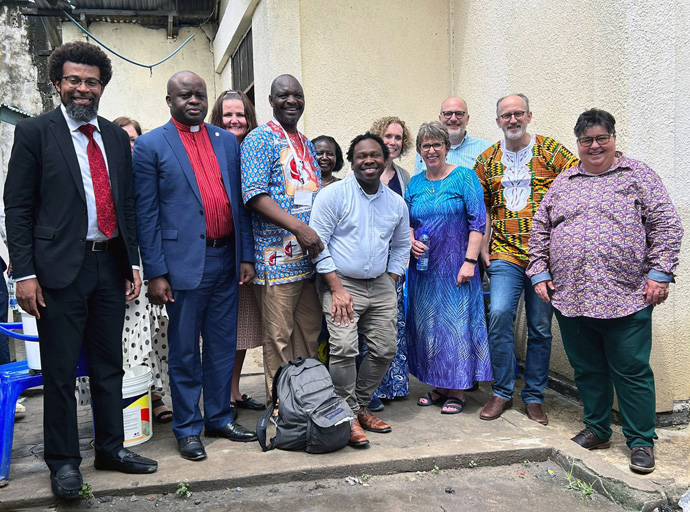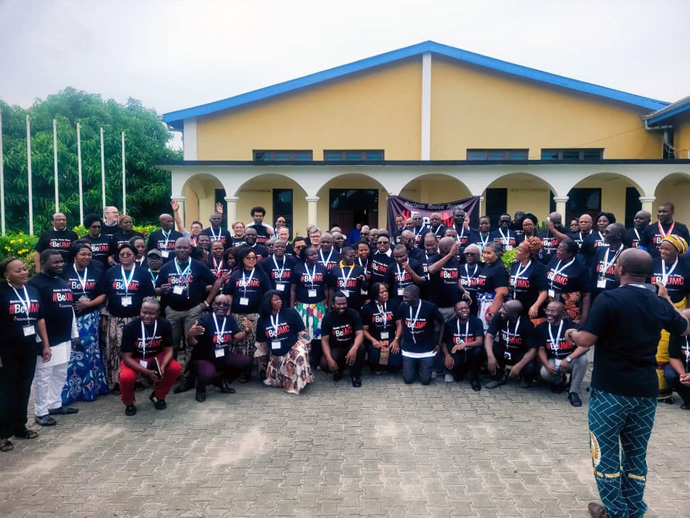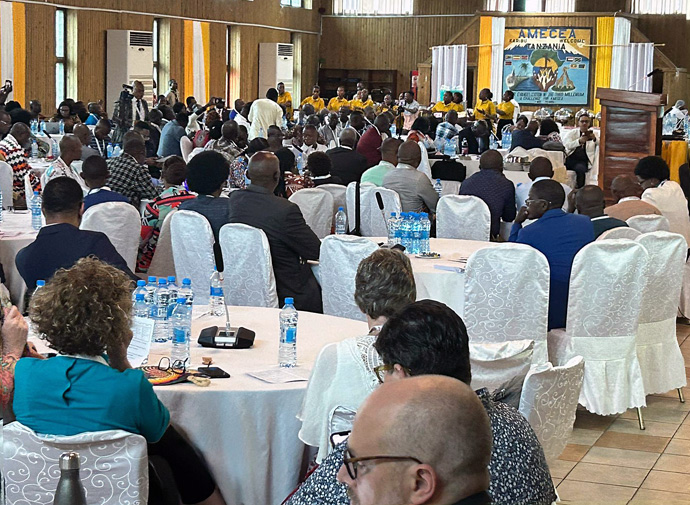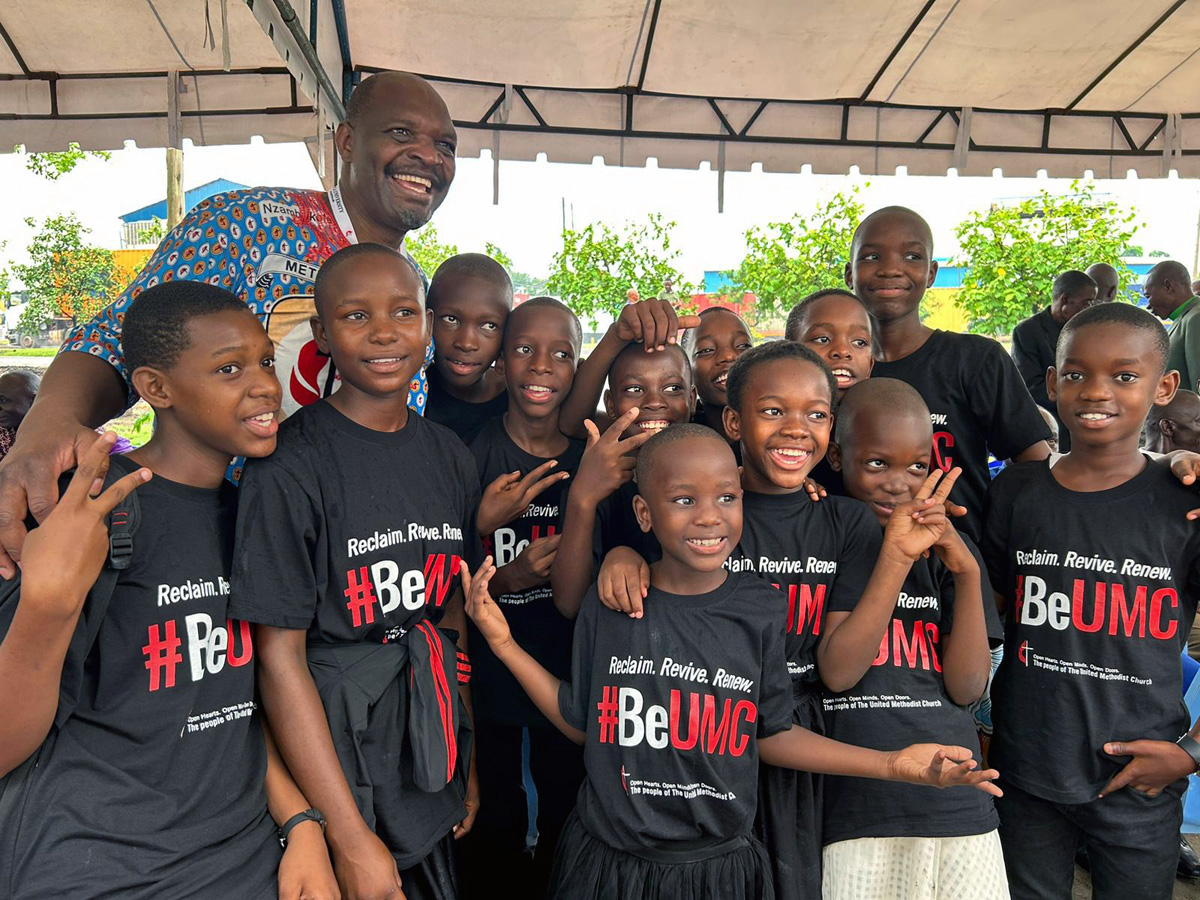Key points:
- The United Methodist Africa Forum brought together about 150 delegates and alternates to discuss issues of concern to the church in Africa ahead of General Conference.
- The African delegates from all three conferences affirmed that they wanted to remain United Methodist.
- Conversations focused on church unity, regionalization, higher education on the continent, addressing misinformation, and the proposed Revised Social Principles.
- The African delegates supported the adoption of the Revised Social Principles with an amendment that reaffirmed that The United Methodist Church must recognize marriage as a sacred, lifelong covenant between a man and a woman.
Editor’s note: This story has been updated to clarify that the number of delegates in attendance included both delegates and alternates to General Conference. The number of delegates at the gathering was lower than stated in the Africa Forum press release.
About 150 African delegates and alternates to the forthcoming General Conference say they are committed to staying in The United Methodist Church and expressed their support for regionalization.
The group gathered Jan. 4-7 in Dar es Salaam, Tanzania, for an orientation organized by the advocacy group United Methodist Africa Forum to prepare for the upcoming legislative assembly, scheduled for April 23-May 3 in Charlotte, North Carolina.
“The delegates unequivocally reject all disaffiliation proposals within the UMC in Africa, reaffirming their commitment to remain faithful members and work towards the church’s continued unity and growth,” the group said in a statement released after the meeting.

The Africa Forum was created last year to foster unity and offer a space for United Methodists to engage in conversations and collaboration. Another advocacy group on the continent, the Africa Initiative, is aligned with traditionalist groups including the Wesleyan Covenant Association and the breakaway Global Methodist Church, which launched in 2022 amid the denomination’s longtime debate around homosexuality.
The Rev. Lloyd Nyarota, general coordinator of United Methodist Africa Forum, said the group is where people with different ideas gather to discuss openly without fear or being manipulated.
“UMAF provided an opportunity for African delegates to review information and dispel all the misinformation going around. There are people, especially in the USA, who have a tendency of speaking on behalf of Africa, and this gathering was to let African delegates speak for themselves on what they will support and the church they want to build.
“The gathering was to discuss and agree on a way forward and (how) we build a greater future for The United Methodist Church in Africa,” Nyarota said.

The coming General Conference is planning to have 862 voting delegates overall — 55.9% from the U.S., 32% from Africa, 6% from the Philippines, 4.6% from Europe and the remainder from concordat churches that have close ties to The United Methodist Church.
Africa has 278 delegates expected to attend General Conference.
The delegates, along with key leaders, bishops and representatives of general agencies, discussed issues of concern to the church in Africa. Conversations focused on regionalization, higher education on the continent, addressing misinformation, and the church’s proposed Revised Social Principles.
Understanding regionalization
The regionalization legislation headed to General Conference takes several steps toward a goal of building connectional unity while making room for customization in each region of the world.
In a new series on regionalization, the Rev. Taylor W. Burton Edwards of Ask The UMC answers questions related to the legislation, including what could be customized by regional conferences and what is not included in the proposal.
Read series here.
In 2012, General Conference authorized an effort to make the Social Principles more succinct, theologically grounded and globally relevant. The revised version coming before delegates this year for a vote is the result of a multiyear process involving input from more than 4,000 United Methodists around the globe.
At the meeting, the African delegates supported the adoption of the Revised Social Principles with an amendment that reaffirmed that The United Methodist Church must recognize marriage as a sacred, lifelong covenant between a man and a woman.
The group also called for the continued prioritization of the Africa University Fund and expressed support for a petition from the United Board of Higher Education and Ministry for a $5 million quadrennial fund to support educational development in Africa.
In discussing regionalization, the group threw its support behind the Christmas Covenant, a plan that central conference leaders introduced shortly before Christmas in 2019. The Christmas Covenant incorporates the U.S. regional conference and goes further to transform the existing central conferences — church regions in Africa, Europe and the Philippines — into regional conferences with equal authority.
In August, the Standing Committee on Central Conference Matters approved sending similar legislation to General Conference. Under that plan, the seven current central conferences and the U.S. would each become United Methodist regional conferences with the same duties and powers to pass legislation for greater missional impact in their respective regions.
“We debated the regionalization legislations and agreed that Africa will support the Christmas Covenant because that is the only regionalization legislation African delegates have had an opportunity to review in different languages,” Nyarota said.
“We discussed the other legislations but found out that they are not widely available to Africans, therefore there is no more time to ask Africans to support pieces of legislation which they have not had an opportunity to read. The delegates clearly voiced their concerns that they have not seen or read the rest of the legislations,” he said.

The Standing Committee’s regionalization legislation has been available in English, French and Portuguese since November.
In their statement, the delegates emphasized “the need for fair representation, equitable resource allocation and shared decision-making power for all regions, including Africa. The importance of parity, equity and equal privileges in finalizing the regionalization legislation is stressed.”
Nyarota said the group of delegates reaffirmed the Africa Forum’s slogan: “We were, we are, and we will always be United Methodists.” They also embraced the denomination’s #BeUMC campaign as a way to talk about remaining United Methodist.
United Methodists on the continent have long been divided on issues surrounding the future of the church. In November, the Rev. Jerry Kulah, the Africa Initiative’s general coordinator, released a statement rejecting regionalization and promoting proposals for disaffiliation. That followed a September statement signed by all of the African bishops, with the exception of Nigeria Area Bishop John Wesley Yohanna, condemning efforts by traditionalist advocacy groups looking to break up the denomination.
“There is a group peddling information that Africa is asking General Conference for disaffiliation legislation. The 190 delegates gathered in Dar es Salaam said they do not need that and they do not know who is speaking for Africa. They agreed to oppose such legislation and committed to stay United Methodist,” Nyarota said.
He called the Africa Forum meeting a “mini General Conference,” noting that there were delegates from all three central conferences in Africa, all five jurisdictions in the U.S. and from the Philippines.
Keynote speaker Bishop Israel M. Painit of the Davao Area in the Philippines Central Conference said an exciting future beckons for the connectional United Methodist Church in the global south, with a focus on the vibrant continents of Africa and Asia.
“This journey ahead is one of great promise, a journey towards a more connected, resilient and impactful church that embraces the rich diversity of our congregations,” he said.
Subscribe to our
e-newsletter
Painit said the five annual conferences in his episcopal area have endorsed regionalization and noted that Galatians 3:28 supports the proposed legislation: “This Scripture emphasizes the unity and equality found in Christ, transcending cultural, social and gender distinctions.”
He said the legislation would celebrate regional diversity as each area would bring its cultures and perspectives, thereby enriching the collective worship experience. It would also empower local leadership to respond more effectively to the unique needs and challenges of their regions.
“In a regionalized structure, worship becomes a dynamic expression of local cultures and traditions. The UMC in Africa and Asia can cultivate contextual worship that resonates deeply with congregants, fostering a more intimate connection with God and promoting a sense of belonging within diverse communities,” he said.
“Let us approach this transition with wisdom and a spirit of unity. Friends, unity is a choice.”
The Rev. Betty Kazadi Musau, a four-time delegate to General Conference from North Katanga in Congo, was grateful for the holy conferencing space created by the forum for African delegates to interact and dispel some myths circulating about regionalization.
“I benefited from the orientation made by Africans for Africans in Africa. It is historic that Africans met in Africa to orientate other delegates, not on the division of the church, but on how to stay united. There was no politics in that. You could see a lot of fellow Africans want to stay in the UMC,” she said. Musau is a member of the governing commission of United Methodist Communications, the parent agency of UM News.
The Rev. Andre Vieira of the East Angola Conference said African delegates were committed to fighting for unity.
“We were speaking (the) same language for the good of the church in Africa,” he said.
Chikwanah is a correspondent for UM News based in Harare, Zimbabwe.
News media contact: Julie Dwyer at (615) 742-5470 or newsdesk@umnews.org. To read more United Methodist news, subscribe to the free Daily or Weekly Digests.




